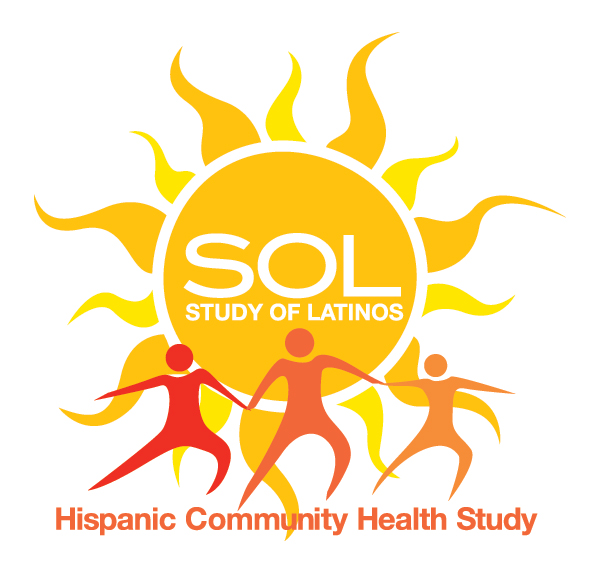Hispanic Community Health Study/Study of Latinos
Also referred to as HCHS/SOL
Overview Heading link

The Hispanic Community Health Study/Study of Latinos (HCHS/SOL) is a multicenter community-based cohort study of diverse Hispanic/Latino adults in the United States. This landmark study was initiated by the National Heart, Lung, and Blood Institute in 2006 and is the largest prospective follow-up study of Hispanics/Latinos that has been conducted in the United States to date.
The HCHS/SOL Field Centers are located at :
- San Diego State University
- University of Illinois Chicago
- Albert Einstein College of Medicine
- University of Miami
The HCHS/SOL Coordinating Center is at the University of North Carolina, Chapel Hill.
Objectives Heading link
The overall objectives of the HCHS/SOL are to identify risk and protective factors for cardiovascular disease (CVD) and pulmonary disease in diverse Hispanic/Latino adults, to determine the role of acculturation in the prevalence and development of disease, and to quantify total mortality, and fatal and nonfatal CVD and pulmonary disease. Understanding the unique risk factors and health problems faced by the Hispanic/Latino population will help to develop tailored interventions and policies to help improve the health of this population.
Baseline Examinations Heading link
Baseline (Visit 1) Examination.
From 2008-2011, the HCHS/SOL recruited 16,415 Hispanic/Latino adults ages 18-74 years at enrollment, from communities in four U.S. cities: San Diego, CA, Chicago, IL, the Bronx, NY and Miami, FL. Participants represent diverse backgrounds including Central American, Cuban, Dominican, Mexican, Puerto Rican, and South American. Participants underwent a comprehensive baseline examination which included objective assessment of CVD risk factors; collection of blood samples; a 12-lead electrocardiogram, hearing examination, pulmonary function tests, and dental examination, ascertainment of demographic, socioeconomic, and lifestyle factors, acculturation, and medical history via questionnaires; and recording of prescription/non-prescription medications used in the past month. Neurocognitive testing and ankle-brachial BP assessment were performed on persons aged 45 years and older.
Visit 2 Examination.
Visit 2 examinations (2014–2017) were conducted on 11,623 participants, with repeat objective measurement of CVD risk factors, and assessment of demographic, socioeconomic and lifestyle factors, acculturation, medical history and medication use.
Visit 3 Examination.
Visit 3 examinations (2020-2024) concluded in January 2024 and included repeat assessment of CVD risk factors, sociodemographic characteristics, sexual orientation. gender identity, medical history and medication use, lifestyle factors, health care access and utilization, health literacy, neighborhood context, financial, housing, and food insecurity, stress, discrimination, depression,
The HCHS/SOL has served as a platform for numerous completed ancillary studies and many more that are ongoing. The HCHS/SOL and its ancillary studies have amassed comprehensive longitudinal data on diverse Hispanic/Latino adults and have made critical contributions to understanding risk factors for and burden of cardiovascular disease (CVD) and related chronic conditions in this population.
Publications Heading link
-
Publications
- Daviglus ML, Talavera GA, Avilés-Santa ML, Allison M, Cai J, Criqui MH, Gellman M, Giachello AL, Gouskova N, Kaplan RC, LaVange L, Penedo F, Perreira K, Pirzada A, Schneiderman N, Wassertheil-Smoller S, Sorlie PD, Stamler J. Prevalence of major cardiovascular risk factors and cardiovascular diseases among Hispanic/Latino individuals of diverse backgrounds in the United States. JAMA. 2012 Nov 7;308(17):1775-84. doi: 10.1001/jama.2012.14517. PMID: 23117778; PMCID: PMC3777250.
- Daviglus ML, Pirzada A, Talavera GA. Cardiovascular disease risk factors in the Hispanic/Latino population: lessons from the Hispanic Community Health Study/Study of Latinos (HCHS/SOL). Prog Cardiovasc Dis. 2014 Nov-Dec;57(3):230-6. doi: 10.1016/j.pcad.2014.07.006. Epub 2014 Aug 2. PMID: 25242694.
- Pirzada A, Cai J, Heiss G, Sotres-Alvarez D, Gallo LC, Youngblood ME, Avilés-Santa ML, González HM, Isasi CR, Kaplan R, Kunz J, Lash JP, Lee DJ, Llabre MM, Penedo FJ, Rodriguez CJ, Schneiderman N, Sofer T, Talavera GA, Thyagarajan B, Wassertheil-Smoller S, Daviglus ML. Evolving Science on Cardiovascular Disease Among Hispanic/Latino Adults: JACC International. J Am Coll Cardiol. 2023 Apr 18;81(15):1505-1520. doi: 10.1016/j.jacc.2023.02.023. PMID: 37045521.
- Pirzada A, Cai J, Cordero C, Gallo LC, Isasi CR, Kunz J, Thyagaragan B, Wassertheil-Smoller S, Daviglus ML. Risk Factors for Cardiovascular Disease: Knowledge Gained from the Hispanic Community Health Study/Study of Latinos. Curr Atheroscler Rep. 2023 Nov;25(11):785-793. doi: 10.1007/s11883-023-01152-9. Epub 2023 Sep 29. PMID: 37773246.